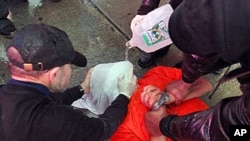London-based human rights organization Amnesty International is calling on the United States to investigate torture in the wake of President George W. Bush's recent public admissions that he authorized waterboarding and other "enhanced interrogation techniques."
While promoting his memoirs, former U.S. President George W. Bush says he believes that the use of waterboarding in interrogations, a form of simulated drowning, saved lives. Amnesty International researcher Rob Freer says the admission should prompt U.S. action. "He admits essentially to authorizing acts which constitute torture under international law, and torture is a crime under international law and the U.S. is under obligation to investigate any allegations of torture and to bring those responsible to justice," he said.
The U.S. Justice department would be responsible for such an investigation. Freer says it should not be limited to waterboarding or the president's admissions.
"There is a lot of evidence now that the crimes of torture and enforced disappearance were committed in the CIA's secret detention program," Freer said.
While U.S. President Barack Obama banned the practice of waterboarding soon after taking office, his administration has declined to launch an investigation into his predecessor. Philippe Sands, an international law expert and professor at University College London says that is bad for international law in general.
"It's very undermining of the rule of law, it opens the door to other countries to do these practices and it undermines American leadership and authority," Sands states.
Because torture is an international crime, it could be prosecuted in many places around the world, Sands says.
"It does expose those who signed off on waterboarding to certain risks if they travel abroad."
He says that includes the former president. "It certainly does include President Bush because there's no immunity for a former head of state in relation to international crimes."
But he says if he were to travel abroad, Mr. Bush would likely be so closely protected that an arrest would be difficult. "Practically, do I think something's going to happen? I think it's extremely unlikely. Is it impossible? No," Sands said.
Amnesty's Freer says Mr. Bush should be investigated no matter his position. "There is no doubt that waterboarding is torture and as I said, torture is a crime and no lawyer, no president, no politician, no interrogator can override that prohibition," he said.
Mr. Bush maintained that information gleaned from the waterboarding technique thwarted attacks at American diplomatic facilities abroad, and at Heathrow airport and Canary Wharf, the banking center of the British capital.




